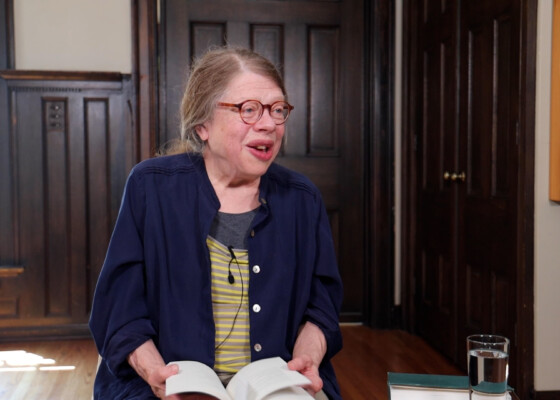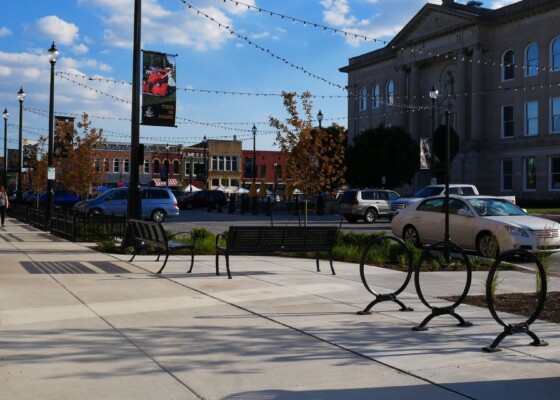You’re Invited: INconversation with Terry Tempest Williams
April 26, 2016It’s not often you get a chance to invite an intellectual crush to come share their ideas with you, let alone two. But because I have the best job in…
It’s not often you get a chance to invite an intellectual crush to come share their ideas with you, let alone two. But because I have the best job in the world, that’s exactly what I got to do for next week’s INconversation with Terry Tempest Williams and Scott Russell Sanders. I can’t think of two other writers working today who’ve done more to deepen my thinking about human connections to our natural world.
Williams—naturalist, educator, writer, and activist—is the author of many acclaimed books, including the now classic Refuge: An Unnatural History of Family and Place, which connects her Mormon heritage, the rising waters of the Great Salt Lake and the history of atomic testing in Utah for a reflective meditation on nature, change, human impact on the land and renewal. Refuge is exactly the kind of creative non-fiction book I love: it unlocks the too-often closed doors between science and humanities, between the spiritual and material worlds, between lived experience and public policy. Though more than 20 years old, the questions the book raises are as urgent as ever.
Williams’ sense of urgency is palpable not only in her writing, but also in her long career as an activist and teacher. A naturalist by training and advocate by calling, “she has consistently shown us how environmental issues are social issues that ultimately become matters of justice.” Williams has camped remote regions of Utah and Alaska, testified before Congress on women’s health issues and worked as a “barefoot artist” in Rwanda. She’s one of those incredible people (and writers) who draws connections where others might fail to see them. Her most recent book, Finding Beauty in a Broken World, takes this mosaic as its central motif, as Williams herself searches for meaning and community in an era of physical and spiritual fragmentation.
During next week’s kick-off event, Williams will be talking with her friend and contemporary Scott Russell Sanders, whose own writing about the hills and forests of southern Indiana continues the tradition of essential Hoosier nature writers like Gene Stratton-Porter and Edwin Way Teale. I knew Sanders before I knew him—on my shelf growing up was the children’s book Aurora Means Dawn, set in Aurora and Rising Sun, the part of the world my mother hails from. It’s the big regret of my college career that I never took a class with him down at IU. He is a living legend and long-time friend of Indiana Humanities.
Sanders is a prolific writer. Perhaps his most famous book, Staying Put: Making a Home in a Restless World, is a must-read for all Hoosiers, regardless of how they feel about spending time outdoors. As the editor of American Earth: Environmental Writing Since Thoreau notes,
For a long time nature writing was mostly about going out to some lovely and unknown place and bringing back the tale…but in recent decades more and more of those who do this kind of writing have concentrated on building a life in their own place and observing it close at hand. This phenomenon is especially notable in the case of Scott Russell Sanders because he has spent his life in the kind of Midwestern locale often considered nondescript and uninteresting “flyover country.” In his capable hands, however, the natural and human drama of Indiana and Ohio seem all the more remarkable for their quietness… By sticking to the limestone country around Bloomington for most of his adult life, Sanders’ sense of his local “place” has acquired a richness that most writers and academics, by habit or inclination often a transient tribe, can only envy. (American Earth, p. 781).
Sanders is also the author of “A Mind in the Forest,” a prize-winning 2009 essay that’s excerpted in our Trek and Talk Toolkits. You can read the full essay in Earth Works: Selected Essays, featured on our Next Indiana Bookshelf.
It’s been a joy to work with Sanders to frame the conversation he’ll have with Williams next week.
If you are a lover of literature, a lover of nature, or simply a lover of big ideas and surprising insights, you have to be there. Tickets are $10 and include a complimentary libation—what are you waiting for?
—————————————————-
Next Indiana Campfires is a unique way to connect nature, literature and Indiana’s Bicentennial. The program is supported by the Efroymson Family Fund, Nina Mason Pulliam Charitable Trust and Pulitzer Prizes Centennial Campfires. Indiana Humanities is supported in part by Lilly Endowment Inc. and the National Endowment of the Humanities.
This post was written by Leah Nahmias, director of programs and community engagement, and is part of the weekly blog series devoted to the Next Indiana Campfires initiative. Check back every Tuesday to learn more about Indiana’s great environmental literature, find out interesting facts about Hoosier stewardship, get all the latest program details and more.


